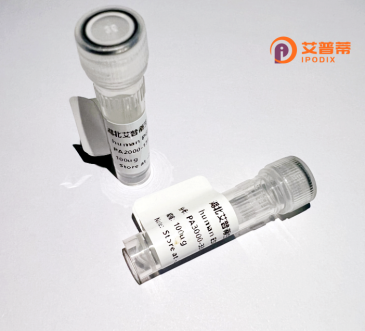
| 纯度 | >90%SDS-PAGE. |
| 种属 | Human |
| 靶点 | MALT1 |
| Uniprot No | Q9UDY8 |
| 内毒素 | < 0.01EU/μg |
| 表达宿主 | E.coli |
| 表达区间 | 2-824aa |
| 活性数据 | ASGRARCTRK LRNWVVEQVE SGQFPGVCWD DTAKTMFRIP WKHAGKQDFR EDQDAAFFKA WAIFKGKYKE GDTGGPAVWK TRLRCALNKS SEFKEVPERG RMDVAEPYKV YQLLPPGIVS GQPGTQKVPS KRQHSSVSSE RKEEEDAMQN CTLSPSVLQD SLNNEEEGAS GGAVHSDIGS SSSSSSPEPQ EVTDTTEAPF QGDQRSLEFL LPPEPDYSLL LTFIYNGRVV GEAQVQSLDC RLVAEPSGSE SSMEQVLFPK PGPLEPTQRL LSQLERGILV ASNPRGLFVQ RLCPIPISWN APQAPPGPGP HLLPSNECVE LFRTAYFCRD LVRYFQGLGP PPKFQVTLNF WEESHGSSHT PQNLITVKME QAFARYLLEQ TPEQQAAILS LV |
| 分子量 | 93 kDa |
| 蛋白标签 | GST-tag at N-terminal |
| 缓冲液 | 0 |
| 稳定性 & 储存条件 | Lyophilized protein should be stored at ≤ -20°C, stable for one year after receipt. Reconstituted protein solution can be stored at 2-8°C for 2-7 days. Aliquots of reconstituted samples are stable at ≤ -20°C for 3 months. |
| 复溶 | Always centrifuge tubes before opening.Do not mix by vortex or pipetting. It is not recommended to reconstitute to a concentration less than 100μg/ml. Dissolve the lyophilized protein in distilled water. Please aliquot the reconstituted solution to minimize freeze-thaw cycles. |
以下是关于重组人MALT1蛋白的3篇代表性文献的简要总结:
1. **"Structural basis for the inhibition of MALT1 paracaspase activity by small molecules"**
- **作者**: Jabran, N., et al.
- **摘要**: 本研究解析了人MALT1蛋白的晶体结构,揭示了其 caspase-like 蛋白酶活性中心的特征。通过重组表达MALT1蛋白,作者验证了小分子抑制剂与其催化结构域的结合模式,为治疗MALT1依赖性淋巴瘤提供了结构基础。
2. **"MALT1 protease activity is required for innate immune signaling via NF-κB activation"**
- **作者**: Brenner, D., et al.
- **摘要**: 文章利用重组人MALT1蛋白及基因敲除模型,证明MALT1的蛋白酶活性通过剪切关键信号蛋白(如HOIL-1)激活NF-κB通路,调节免疫反应和炎症反应,为自身免疫疾病治疗提供潜在靶点。
3. **"Targeting MALT1 protease activity in activated B cell-like diffuse large B cell lymphoma"**
- **作者**: Fontan, L., et al.
- **摘要**: 研究发现重组MALT1在ABC-DLBCL(弥漫大B细胞淋巴瘤)中异常激活,其蛋白酶活性通过介导BCR信号通路驱动肿瘤存活。实验显示选择性MALT1抑制剂可诱导癌细胞凋亡,提示其作为精准治疗药物的潜力。
以上研究聚焦于MALT1的结构、功能及抑制剂开发,涵盖基础机制到临床应用。如需具体文献来源,可进一步检索PubMed或Sci-Hub获取全文。
MALT1 (Mucosa-associated lymphoid tissue lymphoma translocation protein 1) is a key signaling protein in the human immune system, primarily involved in regulating NF-κB pathways. Structurally, it belongs to the paracaspase family, characterized by a caspase-like protease domain, though it cleaves substrates after arginine residues. MALT1 interacts with BCL10 and CARD11 to form the CBM complex, which transmits signals from antigen receptors (e.g., B-cell/T-cell receptors) to activate NF-κB, promoting lymphocyte proliferation, survival, and inflammatory responses.
Recombinant human MALT1 protein is engineered using expression systems like *E. coli* or mammalian cells (e.g., HEK293) to produce highly purified, functional protein for research. This recombinant form often includes tags (e.g., GST, His) for simplified purification and detection. Researchers use it to study MALT1’s protease activity, its role in immune signaling, and aberrant activation linked to cancers, particularly B-cell lymphomas where chromosomal translocations dysregulate MALT1. Additionally, MALT1 inhibitors are explored as potential therapeutics for autoimmune diseases and lymphoproliferative disorders, making recombinant protein vital for drug screening and mechanistic studies. Its biochemical characterization helps uncover structural insights, substrate specificity, and regulatory mechanisms in both normal and pathological contexts.
×